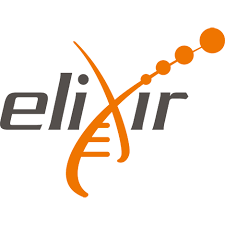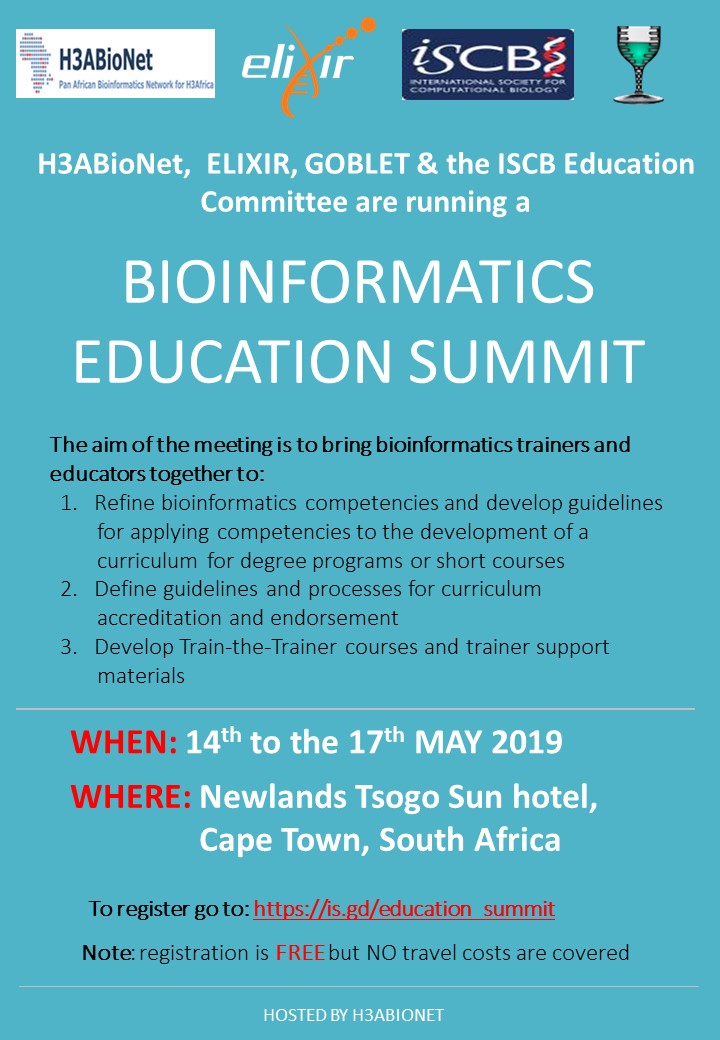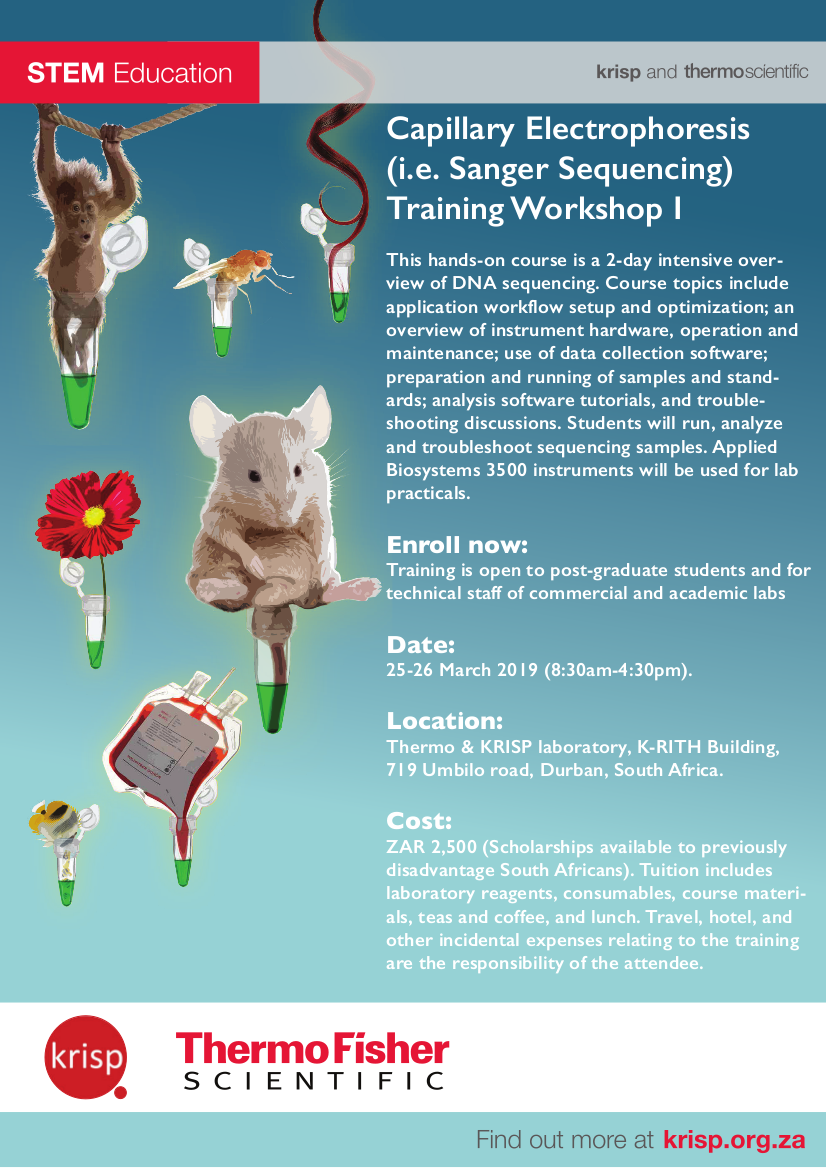Tools and Services
Resources
Communication
Course Overview: The H3ABioNet 16S rRNA Microbiome Intermediate Bioinformatics course will provide training to enable participants to gain the knowledge and skills to perform 16S rRNA microbiome data analyses using a variety of bioinformatics methods and tools.
The H3ABioNet 16S rRNA Microbiome Intermediate Bioinformatics course will use a blended learning approach similar to the popular H3ABioNet Introduction to Bioinformatics Training (IBT) through the use of a combination of theoretical and practical sessions in order for participants to gain knowledge in the use of various tools and resources needed for 16S rRNA microbiome data analysis. There will be 2 contact sessions per week consisting of both theoretical and practical coursework. Participants will generally watch pre-recorded videos in their classrooms (theory) followed by a practical exercise for the remainder of the session. Contact sessions will generally be 4 hours each however the exact format and length of classes will be communicated in due course.
Keywords: 16S, Microbiome, NGS, Genomics, Nucleic acid analysis
Skill level of training: Intermediate
Language: English
Credential awarded: Letter of completion
Type of training: Blended/hybrid learning
Dates for the Course: August to October 2019 (exact dates and times to be confirmed)
Venue of the Course: Successful hosting classrooms (we have 26 registered classrooms)
Course Organizers: Verena Ras, Gerrit Botha, Shaun Aron, Sumir Panji, Nicola Mulder
Course Objectives: By the end of the course participants should be able to:
Intended Audience: Anyone who will be working with 16S rRNA microbiome data and would like to learn more about the bioinformatics analyses.
Syllabus and Tools:
Participant application date opens: 17 July 2019
Participant application date closes: 14 August 2019
Link to participant application form: https://is.gd/intbt_participant_application
Prerequisites (for participants): As this is an intermediate course, some familiarity with the Unix command line and R scripting will be assumed. However, should participants wish to gain some background knowledge before the start of the course, the following tutorials will provide a good foundation.
Linux: http://www.ee.surrey.ac.uk/Teaching/Unix/
R: https://www.statmethods.net/r-tutorial/index.html
R: https://www.datacamp.com/courses/free-introduction-to-r
Workshop limitations: This workshop provides an overview and guidance on 16S rRNA microbiome analyses and will provide you with the ability to perform a variety of analyses on microbiome data. The course however will not teach any advanced programming or go into depth with R or Unix. Participants are encouraged to explore these tools in greater depth independently.
Training Materials Availability:
Training materials for this course are available as a single downloadable archive here: https://doi.org/10.25375/uct.19106780. Should you re-use any of these materials, please ensure that both the author/s of the material AND H3ABioNet are clearly credited.
Course Overview: Various data intensive initiatives are taking place in South Africa that will involve in the storing and describing of genomics data in various platforms. The utility of data for research and reuse is how well structured and described the data and meta-data records are as this contributes towards making data FAIR.
Bioschemas (https://bioschemas.org/) aims to improve data findability and interoperability in life sciences. It does this by encouraging people in life science to use schema.org markup, so that their websites and services contain consistently structured information. This structured information then makes it easier to discover, collate and analyse distributed data. The main outcome of Bioschemas is a collection of specifications that provide guidelines to facilitate a more consistent adoption of schema.org markup within the life sciences.
The course will consist of two parts, an introduction and overview of Bioschemas, current implementation cases and a second part where participants with a technical computing background and access to their repository can work on implementing bioschemas and bioschema type forms on their websites for data deposit.
Intended Audience: People who work with the various data management initiatives and platforms in South Africa and would like to learn more about Bioschemas, and would like to incorporate Bioschemas when provisioning their services.
Keywords: data handling, ontologies, bioschemas, data management
Language: English
Skill level: Intermediate
Type of training: face-to-face / in person
Credential awarded: none
Venue of workshop: Health Teaching Labs 3 – 5, Basement of Anatomy Building, UCT Health Sciences Faculty.
Dates for the workshop: 13th May 2019
Workshop organisers: Niall Beard, Paballo Chauke, Sumir Panji, Nicola Mulder
Participation: By invitation only
Registration opens: 2nd May 2019
Registration closes: 6th of May 2019 (6:00pm)
Notification date: 7th of May 2019
Link to application form: https://is.gd/bioschemas_2019
Workshop Sponsors: Bioschemas, Elixir and H3ABioNet
Syllabus and Tools: The workshop will provide an overview of Bioschema.org, its approach and its principles. Focus will be on practical hands-on sessions where developers learn how to annotate their resources using BioSchemas.org specifications.
Prerequisites: Some basic knowledge of research data management with a focus on genomics data. For the technical part of the workshop having knowledge of the data store one is working with and the ability to edit websites and pages on their data stores. Some background information can be accessed at: https://bioschemas.gitbook.io/training-portal/
Objectives: After this workshop participants should:
Workshop limitations: This workshop provides and overview and guidance on using and implementing Bioschemas.
Training Materials Availability:
Training materials used for this course were not directly produced by H3ABioNet but may be accessed here: https://www.slideshare.net/NiallBeard/bioschemas-workshop. Please note, these materials may be governed by different sharing/re-use policies, and you are encouraged to follow the policies of the external providers regarding material re-use and/or sharing.
 |
 |
 |

Venue of workshop: Face to face workshop/working meeting at the Tsogo Sun Hotel, in Newlands, Cape Town
Dates for the workshop: 14th May – 17th May 2019 *(13th May 2019 - Bioschemas workshop at UCT)
Workshop organisers: Nicola Mulder, Verena Ras, Paballo Chauke, Shaun Aron, Sumir Panji, Kim Gurwitz, Cath Brooksbank, Niall Beard, Sarah Morgan, Celia van Gelder, Michelle Brazas, Teresa Attwood
Registration opens: 27th February 2019
Registration Closes: 31 March 2019
Notification date for the Education Summit workshop: Selections will only be made if the number of registrations exceeds capacity as space is limited. Notification will be by 5th April 2019.
Link to registration form: https://is.gd/education_summit
Participation: The summit is open to Bioinformatics trainers and educators, interested in working together on the development of guidelines, materials and resources for trainers.
Workshop Sponsor: H3ABioNet, GOBLET, ELIXIR and ISCB Education Committee
Summit Overview:
The aim of the meeting is for bioinformatics trainers and educators to:
Intended Audience: Bioinformatics Trainers and Educators
Tools: We will be using existing guidelines, reports, strategies and documents to assist us in developing new guidelines and resources.
Prerequisites: Training and Education knowledge in the field of Bioinformatics broadly including competencies, curriculum, assessments and accreditation.
Workshop limitations: This will be a working meeting where we hope to make substantial progress on the above objectives/ overview and come out with guidelines and materials. Where required there will be a few talks to introduce or provide context around the topics. If time is limited, we might have to continue developing the guidelines online after the workshop.
Course Overview: The Ensembl project at www.ensembl.org provides a comprehensive and integrated source of annotation of mainly vertebrate genome sequences. This 1-day workshop offers participants the possibility of gaining hands-on experience in the use of the Ensembl genome browser but also provides them with the necessary background information. Our sister project at www.ensemblgenomes.org can also be covered if participants are working with bacteria, plants, fungi, protists or (invertebrate) metazoa.
Intended Audience: Wet-lab researchers and bioinformaticians
Keywords: Genetics, Genomics. Nucleic acids analysis
Language: English
Skill level: Beginner
Type of training: face-to-face / in person
Credential awarded: letter of participation
Venue of workshop: UCT Med-school, Anatomy Building, Health Teaching Lab 1
Dates for the workshop: 20 May 2019
Workshop organisers: Ben Moore, Nicola Mulder, Sumir Panji, Verena Ras
Registration opens: 15 April 2019
Registration closes: 12 May 2019
Notification date: 16 May 2019 (accepted participants)
Link to application form: https://is.gd/ensembl
Link to EBI page for additional information: https://www.ebi.ac.uk/training/events/2019/ensembl-browser-workshop-university-cape-town-20th-may-2019
Participation: People who will be using or are using the Ensembl genome browser for their research, or would like to learn more about how to use the Ensembl browser. Selection will be done via an application process.
Workshop Sponsors: H3ABioNet and Ensembl
Objectives: After this workshop participants should be able to:
Syllabus and Tools:
Morning: Introduction to Ensembl and Ensembl genes. Viewing genes and locations in the browser. Data export with BioMart.
Afternoon: The afternoon sessions depend on the participants' interest. We can cover genetic variation, comparative genomics and gene regulation, depending on what you express an interest in when you register.
Prerequisites: None
Feedback from previous courses: "There are probably quite few people out there who all assume that Ensembl today is the same as it was years ago. It is not. With many new features and datasets incorporated/interlinked, it offers data exploration like never before. This course was a very useful update on what Ensembl has become" Browser workshop, CRUK, April 2016
"Very useful workshop, certainly one of the most informative and useful I have attended. Delivered by someone who was extremely familiar with the website and its capabilities, not someone who had used it a couple of times and proclaimed themselves to be an expert." Browser workshop, Cardiff, March 2014
If you think you'd like to host a similar course at your institute, you can find out more on the Ensembl workshops page.
Training Materials Availability:
Training materials used for this course were not directly produced by H3ABioNet but may be accessed here: http://training.ensembl.org/events/2019/2019-05-20-CapeTown. Please note, these materials may be governed by different sharing/re-use policies, and you are encouraged to follow the policies of the external providers regarding material re-use and/or sharing.
 |
 |

Venue of workshop: Thermo-KRISP Lab, Nelson Mandela School of Medicine, UKZN, Durban, South Africa
Dates for the workshop: 25-26 March 2019
Workshop organisers: Thermo Fisher and KRISP
Registration opens: currently open
Registration closes: 25 February 2019
Link to application form: http://www.krisp.org.za/manuscripts/KRISPThermoSanger2019.doc
Please submit application forms to:
Mrs Gugulethu Cynthia Mkhize
Tel: +27 31 260 4198
Email:
Participation: Cost: ZAR 2,500 (Scholarships available to previously disadvantaged South African learners)
Course Overview: This class is designed for users of capillary electrophoresis (CE) technology. Attendees will benefit by having training in a class environment, hands-on lab practicals and interaction with fellow attendees and Life Technologies application scientists during lecture and discussion sessions. The instrument used during the training will be the 3500 series.
Intended Audience: Training is open to University Post-Graduate Students & Technical Staff of Commercial and Academic laboratories.
Syllabus and Tools: This hands-on course is a 2-day intensive overview of DNA sequencing. Course topics include application workflow setup and optimization; an overview of instrument hardware, operation and maintenance; use of data collection software; preparation and running of samples and standards; analysis software tutorials, and troubleshooting discussions. Students will run, analyze and troubleshoot sequencing samples as well as fragment analysis samples. Applied Biosystems 3500 instruments will be used for lab practicals.
Tuition includes laboratory reagents, consumables, course materials, breakfast, and lunch. Travel, hotel, and other incidental expenses relating to the training are the responsibility of the attendee.

Page 2 of 5
Tools and Services
Communication

